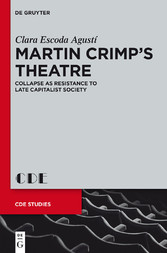Search and Find
Service
Acknowledgements
7
I Preliminaries I: Introduction and Rationale
13
II Preliminaries II: Martin Crimp’s Theatre, a Pedagogy of Resistance
25
1 Martin Crimp’s Context
27
1.1 Late Capitalism and Societies of Control
27
1.2 A Post-Holocaust Writer: Capitalism and Barbarism
33
2 The Semiotic Potential of Collapse on Stage
40
2.1 Collapse on Stage: What it is and how it Works
40
2.2 I Have Witnessed: Testimony and Audience Responsibility
42
2.2.1 Auschwitz and Testimony
42
2.2.2 Audience, Resistance and Testimony
47
3 Redefining Ethics: A Collapsing Body
53
III Beginnings of a Dramaturgy: Violence, Memory and Retribution in The Treatment (1993)
61
1 Introduction: Collapse, ‘In-Yer-Face’ Theatre and the ‘Society of Spectacle’
63
2 The ‘Spectacle’ Filled our Pockets: Duplicity, Sexism and the Market
70
2.1 La Dérive: Marginal Spaces of Resistance
73
2.2 ‘Like A Disapproving Person’: Collapse, Pretence and Alienation
80
3 The Point of Rupture: Collapse and Barbarism
89
3.1 Stopping the Technology: Détournement, ‘Luddism’ and ‘Terrorism’
93
3.2 Clifford’s Eyes and the ‘Banality of Evil’
98
3.3 A Rewriting and a Parable of Ambition
104
3.4 Audience and Violence: From Voyeurs to Active Witnesses
110
4 Conclusion: Towards Subjectivity and Ethics
112
IV Postdramatic Plays: Attempts on her Life (1997) and Face to the Wall (2002)
115
1 Interpretation, Self-Regulation and Postdramatism
122
1.1 Crimp and Postdramatism
122
2 Short Circuits of Desire: Language and Power in Attempts on her Life
128
2.1 The ‘Camera’, Narcissism, and the ‘Society of Spectacle’
128
2.2 ‘I Can’t’: A Body in Denial
136
2.3 Ready-mades, Language and Power
147
3 ‘The Stage, a Skull’: Male Collapse as Resistance in Face to the Wall
153
3.1 Fewer Emergencies (2005) and the Non-Hierarchical Theatrical Experience
155
3.2 ‘The Warm Metal - Thank You - of the Gun’: Interpretation and Violation
163
3.3 ‘Voyeurs in Bedlam?’: Re-Materializing the Audience
170
V Dramatic Plays: Female Breakdown as Micropolitical Resistance
179
1 Stopping Time: Memory and Resistance in The Country (2000)
181
1.1 Introduction
181
1.1.1 Of Violence and Pathos
181
1.1.2 ‘Paper, Scissors, Stone’: A Narrative of Testimony and a Power Game
188
1.2 Collapse as Self-Awareness: Corinne’s Change
193
1.2.1 Collapse, Mercantilism and ‘Empire’
194
1.2.2 Virgil, Collapse and Testimony
197
1.3 ‘It is Only the Flesh’: Rebecca’s Moral Imagination
200
1.3.1 Collapse as Violence
200
1.3.2 Madness as Reason’s Other
205
1.4 Patchwork of Voices, Swarm of Resistance
209
1.4.1 Outbursts of Solidarity
211
1.4.2 Community of Resistance
214
1.5 ‘Oh, to Reverse’: Spiralling Towards Full Time
220
1.5.1 Collapsing Boundaries
221
1.5.2 Stopping Time: An Ethics of Resentment
224
1.5.3 Testimony and Late Capitalism
228
1.5.4 Path of Discovery: the Ethics of Spectatorship
232
1.5.5 To Survive: Self-Creation and the Paring Down of Selfhood
237
1.6 Conclusion: Turning Towards Psychology
240
2 Oppression, Resistance and Terrorism in Cruel and Tender (2004)
243
2.1 Sophocles, Crimp and Bondy
243
2.2 Radical Ethics: The Body as Weapon, Insight and Image
251
2.2.1 The Cartesian Self: Verticality and the Word
252
2.2.2 Amelia’s ‘Embodied’ Tongue
255
2.3 Of Shamans and Cyborgs: From Bodies of Mastery to Bodies of Need
259
2.3.1 Invocation and Ritual
261
2.3.2 A Utopia of Mutual Dependency
264
2.4 Collapse and Testimony: Late Capitalism and Totalitarianism
273
2.4.1 Inequality, Auschwitz and the Collapsing Self
276
2.4.2 Opening a Space of Exteriority
283
2.4.3 The Inheritance of Resistance
288
2.5 Conclusion: Memory as Imperative and Yearning
291
VI Testimony and World Inequality in Crimp’s Adaptation of Anton Chekhov’s The Seagull (2006)
295
1.1 Introduction: Mirroring Fragments, Play-Within-a-Play
297
1.2 Testimony as Resistance: Crimp’s and Mitchell’s Play-Within-a-Play
301
1.3 ‘Cold, Blank, Distant’: Breakdown as Resistance
310
VII General Conclusions: Martin Crimp’s Theatre: a Dramaturgy of Resistance
325
VIII Works Cited
339
Primary Sources
341
Secondary Sources
342
All prices incl. VAT











